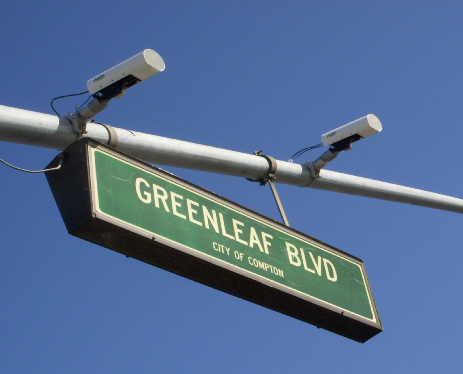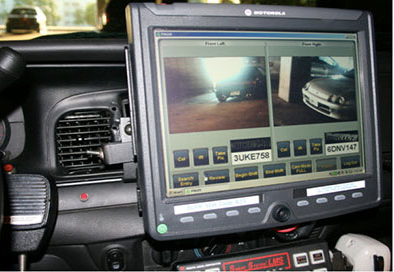– Los Angeles Cops Argue All Cars in LA Are Under Investigation (Electronic Frontier Foundation, March 19, 2014):
The Freedom of Information Act is not the only law the public can use to obtain records from the government. Most states have similar laws for accessing documents on the state and local levels. Here in California, EFF is using the California Public Records Act to learn what new technologies local law enforcement agencies are using and whether these technologies violate our rights.
Do you drive a car in the greater Los Angeles Metropolitan area? According to the L.A. Police Department and L.A. Sheriff’s Department, your car is part of a vast criminal investigation.
The agencies took a novel approach in the briefs they filed in EFF and the ACLU of Southern California’s California Public Records Act lawsuit seeking a week’s worth of Automatic License Plate Reader (ALPR) data. They have argued that “All [license plate] data is investigatory.” The fact that it may never be associated with a specific crime doesn’t matter.
This argument is completely counter to our criminal justice system, in which we assume law enforcement will not conduct an investigation unless there are some indicia of criminal activity. In fact, the Fourth Amendment was added to the U.S. Constitution exactly to prevent law enforcement from conducting mass, suspicionless investigations under “general warrants” that targeted no specific person or place and never expired.
ALPR systems operate in just this way. The cameras are not triggered by any suspicion of criminal wrongdoing; instead, they automatically and indiscriminately photograph all license plates (and cars) that come into view. This happens without an officer targeting a specific vehicle and without any level of criminal suspicion. The ALPR system immediately extracts the key data from the image—the plate number and time, date and location where it was captured—and runs that data against various hotlists. At the instant the plate is photographed not even the computer system itself—let alone the officer in the squad car—knows whether the plate is linked to criminal activity.
Taken to an extreme, the agencies’ arguments would allow law enforcement to conduct around-the-clock surveillance on every aspect of our lives and store those records indefinitely on the off-chance they may aid in solving a crime at some previously undetermined date in the future. If the court accepts their arguments, the agencies would then be able to hide all this data from the public.
However, as we argued in the Reply brief we filed in the case last Friday, the accumulation of information merely because it might be useful in some unspecified case in the future certainly is not an “investigation” within any reasonable meaning of the word.
LAPD and LASD Recognize Privacy Interest in License Plate Data
In another interesting turn in the case, both agencies fully acknowledged the privacy issues implicated by the collection of license plate data.
LAPD stated in its brief:
[T]he privacy implications of disclosure [of license plate data] are substantial. Members of the public would be justifiably concerned about LAPD releasing information regarding the specific locations of their vehicles on specific dates and times. . . . LAPD is not only asserting vehicle owners’ privacy interests. It is recognizing that those interests are grounded in federal and state law, particularly the California Constitution. Maintaining the confidentiality of ALPR data is critical . . . in relation to protecting individual citizens’ privacy interests”
The sheriff’s department recognized that ALPR data tracked “individuals’ movement over time” and that, with only a license plate number, someone could learn “personal identifying information” about the vehicle owner (such as the owner’s home address) by looking up the license plate number in a database with “reverse lookup capabilities such as LexisNexis and Westlaw.”
The agencies use the fact that ALPR data collection impacts privacy to argue that—although they should still be allowed to collect this information and store it for years—they should not have to disclose any of it to the public. However, the fact that the technology can be so privacy invasive suggests that we need more information on where and how it is being collected, not less. This sales video from Vigilant Solutions shows just how much the government can learn about where you’ve been and how many times you’ve been there when Vigilant runs their analytics tools on historical ALPR data. We can only understand how LA police are really using their ALPR systems through access to the narrow slice of the data we’ve requested in this case.
We will be arguing these points and others at the hearing on our petition for writ of mandate in Los Angeles Superior Court, Stanley Mosk Courthouse, this coming Friday at 9:30 AM.
UPDATE: This hearing has been postponed until April.
The Freedom of Information Act is not the only law the public can use to obtain records from the government. Most states have similar laws for accessing documents on the state and local levels. Here in California, EFF is using the California Public Records Act to learn what new technologies local law enforcement agencies are using and whether these technologies violate our rights.
Do you drive a car in the greater Los Angeles Metropolitan area? According to the L.A. Police Department and L.A. Sheriff’s Department, your car is part of a vast criminal investigation.
The agencies took a novel approach in the briefs they filed in EFF and the ACLU of Southern California’s California Public Records Act lawsuit seeking a week’s worth of Automatic License Plate Reader (ALPR) data. They have argued that “All [license plate] data is investigatory.” The fact that it may never be associated with a specific crime doesn’t matter.
This argument is completely counter to our criminal justice system, in which we assume law enforcement will not conduct an investigation unless there are some indicia of criminal activity. In fact, the Fourth Amendment was added to the U.S. Constitution exactly to prevent law enforcement from conducting mass, suspicionless investigations under “general warrants” that targeted no specific person or place and never expired.

ALPR systems operate in just this way. The cameras are not triggered by any suspicion of criminal wrongdoing; instead, they automatically and indiscriminately photograph all license plates (and cars) that come into view. This happens without an officer targeting a specific vehicle and without any level of criminal suspicion. The ALPR system immediately extracts the key data from the image—the plate number and time, date and location where it was captured—and runs that data against various hotlists. At the instant the plate is photographed not even the computer system itself—let alone the officer in the squad car—knows whether the plate is linked to criminal activity.
Taken to an extreme, the agencies’ arguments would allow law enforcement to conduct around-the-clock surveillance on every aspect of our lives and store those records indefinitely on the off-chance they may aid in solving a crime at some previously undetermined date in the future. If the court accepts their arguments, the agencies would then be able to hide all this data from the public.
However, as we argued in the Reply brief we filed in the case last Friday, the accumulation of information merely because it might be useful in some unspecified case in the future certainly is not an “investigation” within any reasonable meaning of the word.
LAPD and LASD Recognize Privacy Interest in License Plate Data
In another interesting turn in the case, both agencies fully acknowledged the privacy issues implicated by the collection of license plate data.
LAPD stated in its brief:
[T]he privacy implications of disclosure [of license plate data] are substantial. Members of the public would be justifiably concerned about LAPD releasing information regarding the specific locations of their vehicles on specific dates and times. . . . LAPD is not only asserting vehicle owners’ privacy interests. It is recognizing that those interests are grounded in federal and state law, particularly the California Constitution. Maintaining the confidentiality of ALPR data is critical . . . in relation to protecting individual citizens’ privacy interests”

The sheriff’s department recognized that ALPR data tracked “individuals’ movement over time” and that, with only a license plate number, someone could learn “personal identifying information” about the vehicle owner (such as the owner’s home address) by looking up the license plate number in a database with “reverse lookup capabilities such as LexisNexis and Westlaw.”
The agencies use the fact that ALPR data collection impacts privacy to argue that—although they should still be allowed to collect this information and store it for years—they should not have to disclose any of it to the public. However, the fact that the technology can be so privacy invasive suggests that we need more information on where and how it is being collected, not less. This sales video from Vigilant Solutions shows just how much the government can learn about where you’ve been and how many times you’ve been there when Vigilant runs their analytics tools on historical ALPR data. We can only understand how LA police are really using their ALPR systems through access to the narrow slice of the data we’ve requested in this case.
We will be arguing these points and others at the hearing on our petition for writ of mandate in Los Angeles Superior Court, Stanley Mosk Courthouse, this coming Friday at 9:30 AM.
UPDATE: This hearing has been postponed until April.


1 thought on “Los Angeles Cops Argue All Cars in LA Are Under Investigation”